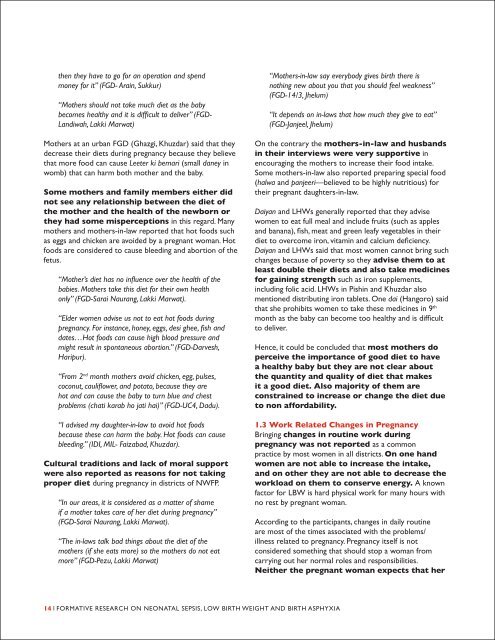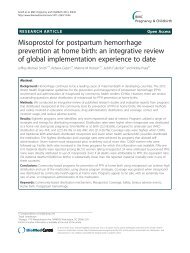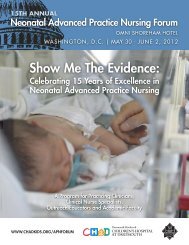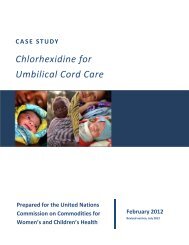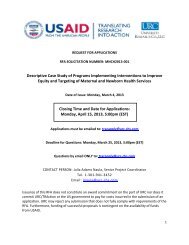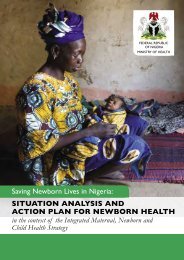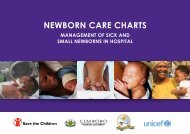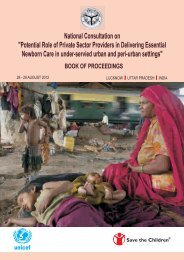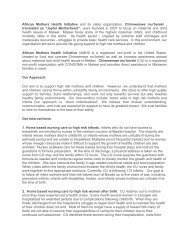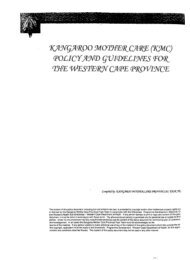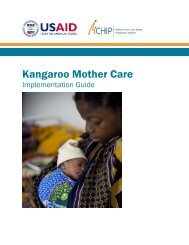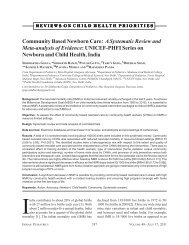Download Resource - Healthy Newborn Network
Download Resource - Healthy Newborn Network
Download Resource - Healthy Newborn Network
Create successful ePaper yourself
Turn your PDF publications into a flip-book with our unique Google optimized e-Paper software.
then they have to go for an operation and spend<br />
money for it” (FGD- Arain, Sukkur)<br />
“Mothers should not take much diet as the baby<br />
becomes healthy and it is difficult to deliver” (FGD-<br />
Landiwah, Lakki Marwat)<br />
Mothers at an urban FGD (Ghazgi, Khuzdar) said that they<br />
decrease their diets during pregnancy because they believe<br />
that more food can cause Leeter ki bemari (small daney in<br />
womb) that can harm both mother and the baby.<br />
Some mothers and family members either did<br />
not see any relationship between the diet of<br />
the mother and the health of the newborn or<br />
they had some misperceptions in this regard. Many<br />
mothers and mothers-in-law reported that hot foods such<br />
as eggs and chicken are avoided by a pregnant woman. Hot<br />
foods are considered to cause bleeding and abortion of the<br />
fetus.<br />
“Mother’s diet has no influence over the health of the<br />
babies. Mothers take this diet for their own health<br />
only” (FGD-Sarai Naurang, Lakki Marwat).<br />
“Elder women advise us not to eat hot foods during<br />
pregnancy. For instance, honey, eggs, desi ghee, fish and<br />
dates…Hot foods can cause high blood pressure and<br />
might result in spontaneous abortion.” (FGD-Darvesh,<br />
Haripur).<br />
“From 2 nd month mothers avoid chicken, egg, pulses,<br />
coconut, cauliflower, and potato, because they are<br />
hot and can cause the baby to turn blue and chest<br />
problems (chati karab ho jati hai)” (FGD-UC4, Dadu).<br />
“I advised my daughter-in-law to avoid hot foods<br />
because these can harm the baby. Hot foods can cause<br />
bleeding.” (IDI, MIL- Faizabad, Khuzdar).<br />
Cultural traditions and lack of moral support<br />
were also reported as reasons for not taking<br />
proper diet during pregnancy in districts of NWFP.<br />
“In our areas, it is considered as a matter of shame<br />
if a mother takes care of her diet during pregnancy”<br />
(FGD-Sarai Naurang, Lakki Marwat).<br />
“The in-laws talk bad things about the diet of the<br />
mothers (if she eats more) so the mothers do not eat<br />
more” (FGD-Pezu, Lakki Marwat)<br />
“Mothers-in-law say everybody gives birth there is<br />
nothing new about you that you should feel weakness”<br />
(FGD-14/3, Jhelum)<br />
“It depends on in-laws that how much they give to eat”<br />
(FGD-Janjeel, Jhelum)<br />
On the contrary the mothers-in-law and husbands<br />
in their interviews were very supportive in<br />
encouraging the mothers to increase their food intake.<br />
Some mothers-in-law also reported preparing special food<br />
(halwa and panjeeri—believed to be highly nutritious) for<br />
their pregnant daughters-in-law.<br />
Daiyan and LHWs generally reported that they advise<br />
women to eat full meal and include fruits (such as apples<br />
and banana), fish, meat and green leafy vegetables in their<br />
diet to overcome iron, vitamin and calcium deficiency.<br />
Daiyan and LHWs said that most women cannot bring such<br />
changes because of poverty so they advise them to at<br />
least double their diets and also take medicines<br />
for gaining strength such as iron supplements,<br />
including folic acid. LHWs in Pishin and Khuzdar also<br />
mentioned distributing iron tablets. One dai (Hangoro) said<br />
that she prohibits women to take these medicines in 9 th<br />
month as the baby can become too healthy and is difficult<br />
to deliver.<br />
Hence, it could be concluded that most mothers do<br />
perceive the importance of good diet to have<br />
a healthy baby but they are not clear about<br />
the quantity and quality of diet that makes<br />
it a good diet. Also majority of them are<br />
constrained to increase or change the diet due<br />
to non affordability.<br />
1.3 Work Related Changes in Pregnancy<br />
Bringing changes in routine work during<br />
pregnancy was not reported as a common<br />
practice by most women in all districts. On one hand<br />
women are not able to increase the intake,<br />
and on other they are not able to decrease the<br />
workload on them to conserve energy. A known<br />
factor for LBW is hard physical work for many hours with<br />
no rest by pregnant woman.<br />
According to the participants, changes in daily routine<br />
are most of the times associated with the problems/<br />
illness related to pregnancy. Pregnancy itself is not<br />
considered something that should stop a woman from<br />
carrying out her normal roles and responsibilities.<br />
Neither the pregnant woman expects that her<br />
14 l Formative Research on Neonatal Sepsis, Low Birth Weight AND Birth Asphyxia


